It takes skills to reinvigorate a tried-and-true genre like
the spy story, however with his fast and funny hit series Burn
Notice, Matt Nix is doing what he can to
throw the style a changeup.
Nix created and still runs the popular USA Network drama,
about a former spy named Michael Weston (Jeffrey Donovan) who
suddenly finds himself out in the cold Ė in sunny Miami. With the
help of his possibly unhinged ex-girlfriend (Gabrielle Anwar), a
not-quite-trustworthy former spy (cult-star Bruce Campbell) and his
not-so-maternal mother (Sharon Gless), Westen tries to figure out
who double-crossed him while using his skills to help normal people
who have been wronged.
As the second season of Burn Notice returns for the
final several episodes (the show was recently renewed for a third
season), Nix was nice enough to do a conference call with us and
several other websites to talk about his show.
What does the success of a show
like this mean to you as a show runner? What does it mean to have a
show thatís so successful and so, I guess, just well received by the
audience?
I guess in terms of the job, the sort of day-to-day of it,
not much actually. People ask me, like, how has your life changed?
Really, I come into the office every day, and then I work for a
really long time, and then I go home. The truth is, it was always a
really fun process, and it still is. The best thing about it is all
of your friends from high school call you. All the people getting
in touch with you, I think that for a lot of people on the show,
oddly, nobody expected this, but everybody comments on it and how
weirdly unexpected and mildly spooky it is. Everybody says to us,
oh, your show is the only show that my daughter watches with her
grandmother or Ė its people have this sort of family thing about it,
and in a funny way, that's the most gratifying because itís totally
not something we expected, having it well received in that way, I
donít know. Itís not like I sat down to do a family spy show, but I
guess it turned out that way.
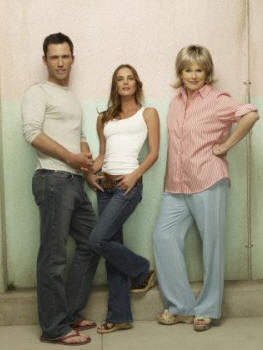 What
are your sources of inspiration for each of the storylines in the
episodes?
What
are your sources of inspiration for each of the storylines in the
episodes?
They come from a lot of places. Iíd say, with regard to
the case of the week stories and the overall Burn Notice
arcs, we focus a lot on taking elements of spy craft from the
history of espionage, including the very early history, to World War
II stuff. It runs the gamut. We have the advantage of being able
to use stuff from all around the world, so weíll read a history of
Russian spies or read all about the Mossad and techniques from
everywhere. Then we also talk a lot to our consulting producer,
Michael Wilson, who has worked in that field and always has good
ideas for places to go for storiesÖ. Because, even though weíre
using it in a different context, itís a really useful touchstone for
us to know that weíre using something that has a basis in reality.
Weíre very interested in technique and how this stuff works. Weíre
all fans of the genre. We all read that stuff for pleasure, and
weíll call Michael Wilson and just ask him questions because heís
fun to talk to. Then we really focus on, okay, how could we use
this thing that was done by Aldridge Aims, who was a famous mole in
the CIA? We all read the Aldridge Aimsí book. Whatís something
Michael could do using an Aims-like strategy, or what something
Michael could do using the strategies that we used to catch Aims?
Then weíll put that in a different context. With regard to the
other storylines, the family storylines and the Burn Notice
storylines, a lot of times we look at what are fun Ė I think youíll
see it more in the second half of the second season, and even more
in the third season. We think a lot about what does doing this kind
of case, what does this situation mean for Michael as a character?
What would the resonance of this technique be for him? What does it
say about him as a guy? What does it take out of him personally?
Are there some things that he would enjoy? What are the things that
he enjoys? What does that mean for his family? What would his
family think about that? We tend to sort of bounce the emotional
stories and the character stories off of the A stories, so weíll
think about where are we in the season. What would that mean for
Michael and Fionaís relationship? How can their relationship echo
where Michael is with regard to his burn notice or with regard to
the case of the week? Thatís how we tend to think about it. To
answer simply, we do a lot of reading and a lot of talking to
sources. Every week we bring in sources, just people who we think
might be interesting to talk to. I will say, actually, one of the
great things about the show has become better known, itís been great
for us in terms of consultants popping up, just people who were
willing to talk to us and be helpful.
I donít want to give away too
many things because I was privileged enough to see the premiere a
little early. I noticed that, Michael especially, I donít want to
use the word brutality, but heís taking a more direct approach in
this first episode. Is that something we can look forward to
throughout the second half of the second season here? He seems to
have grown a little weary of the finesse it takes to get these con
jobs done, and is taking a little more route of the scare tactics.
Thatís something we thought a lot about with this episode.
Let me put it this way. I think youíll see the tension between the
idea that taking a very direct approach might be the most effective
thing in a situation, but it also comes at a significant cost. In
this premiere episode, we were kind of looking at what does it mean
for Michael to be shaken? What does he do when heís knocked off his
game? What does Fiona do when sheís knocked off her game?
Everybody is really thrown through a loop by what happened at the
end of [the last half of the] season, by Michael nearly getting
himself blown up. This first episode is Michael off his footing,
and so it was more about exploring what does that mean, and it means
Michael is not infallible. Thereís a point in the episode, as you
saw, where it looks like heís going to make a really bad choice.
Sam, although he helps Michael with this more direct, as you put it,
way of dealing with things, objects to it and says, I donít like
doing this kind of stuff, and I donít think itís a good idea. And
ends up doing it anyway because Michael is his friend, but heís
really on edge. Part of the point of this episode was to examine
what does it mean for Michael to be off his footing? Also, how does
he find his footing again? Part of that is Michael acknowledging
for the first time that thereís something about helping people that
he needs, that heís not just a guy who is wearily doing things for
desperate people when he would really rather be doing something
else. Thereís some part of Michaelís psyche that needs to do this
stuff, that needs to be useful to people, that needs to be using his
skills and engaging with the world in that way even though he isnít
really supposed to be doing that for his job anymore. That was
really what it was about. The answer is, for the rest of the
season, is he giving up guile in favor of using his fists or kind of
direct brutality? No. The hope in this season premiere was that
part of what you see is him kind of starting in this shaken place
where he is doing things in a more direct fashion, and then kind of
returning more to form by the end of the episode. That emotional
tension is something that we explore for the rest of the season, but
weíre exploring where are those lines, and how does Michael
negotiate those lines? What do these clients really mean to him?
Why is he doing this? Does he really care that much about $6,000,
or is there something more to it?
 Bruce
mentioned
The Rockford Files in terms of some of the tone of the
show. I get the impression that Burn Notice is kind of a
mash-up of The Rockford Files and It Takes a Thief. I
was wondering how do you get that balance?
Bruce
mentioned
The Rockford Files in terms of some of the tone of the
show. I get the impression that Burn Notice is kind of a
mash-up of The Rockford Files and It Takes a Thief. I
was wondering how do you get that balance?
Iíd say that thereís actually a lot of classic television,
[such as] the Rockford Files, It Takes a Thief.
People bring up Magnum, MacGyver, The A-Team, a
lot of these shows, some of which I watched, and some of which I
didnít watch. But all of us, between the entire staff, we all
watched all of those at one point or another. One of the things we
use as a touchstone that owes a lot to classic television is the
idea that Michael is a classic hero. We all like Michael. We all
like Sam. We all like Fiona. We all like Madeline. If you think
about a lot of contemporary television, including a lot of my
favorite shows Ė I mean Iím not slamming this at all Ė it is an
important part of contemporary television, feeling ambivalent about
the characters that youíre watching is. Itís something that people
do now. I think Burn Notice is not that. When you look at
Rockford, Rockford is just kind of a guy. At least my reaction to
him was, heís a guy you want to know. Magnum is just cool, heís a
good dude. When weíre all writing Sam, weíre thinking about whatís
the brother we want. Whoís that guy? When we think about Michael,
itís whatever challenges or whatever darkness he may struggle with,
ultimately heís a hero. Heís a guy whoís going to put his ass on
the line to save people. Those are the touchstones we use, and I
think that is a bit of a throwback to classic television. Itís a
world where people are really trying to do the right things for
other people. The characters on the show, however they bicker, are
a family and they stick together. That's what they do. I think
that's sort of comforting. Itís fun to write, and I there are a lot
of interesting and subtle things to explore within that. Thatís the
kind of television that I really cared about growing up, and I think
thereís a place for it. Thatís part of what weíre doing.
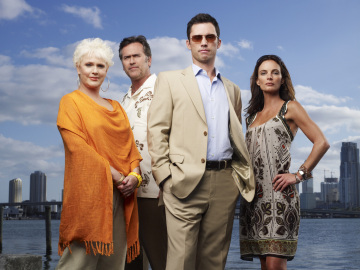 How much of season three have you planned already? Where
do you think youíre going to take us in season three?
How much of season three have you planned already? Where
do you think youíre going to take us in season three?
We have planned a lot of it. Weíre working on it now. I
donít want to give too much away, but basically I think that season
three, weíre going to find out a lot more about Michaelís past. Not
just Michaelís past Ė Samís past, Fionaís past. For various
reasons, they are all going to be engaging with some of the ghosts
of their previous careers. Thatís something weíre really excited
about, and itís a way of exploring. Weíve done some of it, but itís
not really something weíve done for a season, and so we have Michael
engaging with his past. Itís not sort of the perpetual search for
the name behind his burn notice. Itís a different thing. I think
people are going to see in the second half of season two that weíre
really trying to push the boundaries of what a Burn Notice
episode is, like how he deals with things. New kinds of clients,
new ways of dealing with problems. As weíve gotten more comfortable
with the format of the show, and as we all become more sort of
facile with how Michael deals with problems, it allows us to spread
our wings a little bit and have him deal with really new and really
different kinds of problems. I think youíll see some of that
definitely in the second half of season two where weíre doing things
that weíve never done before. Season three, itís going to be a
really eclectic and fun mix of episodes. I think weíve got some
really neat ideas, and weíre all really excited about them. The
thing for the show for a lot of us Ė and maybe I shouldnít say this,
but itís true Ė is weíre kind of inventing a procedural format. You
know, Michael is not a straight up PI. Heís not a doctor. Heís not
a cop. He doesnít have a way of doing things that has a lot of
procedural history on television. Thereís not really a book that
you can go to and say, how would a spy deal with this civilian
situation? So weíve been kind of exploring and defining how to do
that because, from week to week, Michael is dealing with some
civilian situation using spy crafts. I mean, there are shows that
we could point to. I mean certainly Magnum had a history in
intelligence. In the Equalizer, he was doing some of those
things. But we are so focused on the deceptive arts of spy craft in
particular on really looking at what specifically did Robert Hanson
do at the FBI, and how can we use that, you know, as a technique for
a Burn Notice, and itís a whole different kind of thing. The
more we read, the more we observe, the more we explore creatively,
the more things we can do. So we have some neat episodes in the
second half of the season. Thereís an episode thatís nearly in real
time. Then in the third season, we take that to another level. I
mean, itís a little funny to talk about it because Iíve been living
with all of these episodes from the second half of the season for
months. Theyíve been done. Now I want to talk about them in
referencing the third season, but I canít do that. Suffice it to
say that weíre really stretching the boundaries, and itís very
exciting for everybody here.
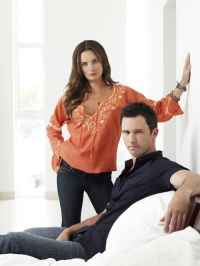 My
question is about your shooting in Miami. Of all the places in the
world where people wouldnít really want to go, how did you come to
decide to play Michael in Miami and have him trapped there?
My
question is about your shooting in Miami. Of all the places in the
world where people wouldnít really want to go, how did you come to
decide to play Michael in Miami and have him trapped there?
Iíve told this story on other occasions, but the short
version is basically I had the brilliant idea of putting it in
Newark, because I was picking a city randomly. I thought, Iím
exploring the psyche of this guy, and he came from this kind of dark
place, and thatís what led him to be a spy, and it felt like a
natural choice to have him come from this sort of gritty place Ė the
mean streets of Newark, and then that led into a life as a spy.
Then, as I was developing the show, USA kept pointing out that: A)
they donít really do things set in Newark. Theyíre kind of a blue
sky network, and that's not their thing. And B) they kept observing
that the thing they really liked about the show was that it was
funny, and they were sort of like, we like that part, you know. Can
you do more of that? I was very resistant to it. Then, ultimately,
they said weíd really like the show to be set someplace sunny like
Miami. I sat down, and at first I was very resistant to it. Then I
thought, well, Iím going to give this a shot. What I discovered
when I actually did it was that I had been setting out, you know,
writing the Newark version was kind of writing the fish in water
story. You know, it makes sense. Heís a fish. Heís in water, you
know. Taking that fish out of the water and putting this gritty,
dark spy in Miami allowed for a lot bigger contrast. A lot more
fun. My question to the network was just, hey, Iíll put it in
Miami, but does he have to like being there? Can I make him a guy
who doesnít want to be in Miami? They said sure, whatever, that
sounds great. Whatever works for you, and makes it fun for you
creatively. Ultimately I was really glad that we set it in Miami
because it allows us to explore a lot of these themes, but do it on
a beach, and do it against a bright background. It makes it fun and
keeps us from taking ourselves too seriously, so it turned out to be
a central part of the show. I do find myself in the odd position
though for a writer to be thanking my lucky stars that I got that
network note. But I do.
I was reading that you just got signed on to do a
Hot Wheels movie. How do you think working on the movie is
going to sort of affect your job with the series? And I know itís a
little bit early, but what did you have in mind for that?
Oh, hilariously, itís not early at all. I actually wrote
the Hot Wheels movie at the beginning of season two, so I can
tell you how it affected me. It was really hard, but I did it, but
basically that project is Ė I think that it was not a particularly
good time for Warner Brothers to make another car movie, if you look
at what was being released at the beginning of last season, Speed
Racer, and it was a tough time for them. I should say, as a
feature writer in Hollywood, itís not like you get a lot of calls
telling you, ďhey, writer; hereís whatís going on. We just wanted
to fill you in.Ē I think itís on hold right now until such time as
the stars align to make another big budget summer car movie. I had
a blast working on it. It was a fun thing. I found actually that
working on Burn Notice had given me a lot more comfort in the
area of writing, you know, fast cars and action, that kind of
thing. I will say, because I wrote it at the beginning of last
season, and because it ended up getting put on hold at the beginning
of last season, if you read the Hot Wheels script, you would
find that there are any number of snippets of dialogue and action
bits that were in the Hot Wheels movie that made their way
into the season. That was sort of a fun thing, to be able to
cannibalize some elements of that script and throw them into Burn
Notice because by the time anything happens with that movie,
itíll be a whole new world. The distance between a movie that gets
mentioned in the trades, and a movie that makes it into the theaters
Ė there are many, many miles between those two. Suffice to say, it
was fun to work on. It was sort of tough to do at the same time as
the show, but it ended up working out fine.
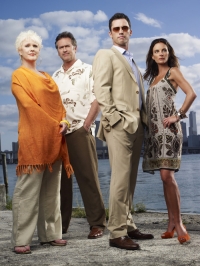 In
season two, we saw Michael go up against some considerably darker
adversaries than he faced in season one. I was wondering if, first,
we would be seeing sort of like Tim Matheson or Michael Shanks
reappear later in the serious and if even more sinister characters
were going to start appearing.
In
season two, we saw Michael go up against some considerably darker
adversaries than he faced in season one. I was wondering if, first,
we would be seeing sort of like Tim Matheson or Michael Shanks
reappear later in the serious and if even more sinister characters
were going to start appearing.
Yes. Yes to all. Well, I should say, Tim Matheson returns
in season two in spectacular fashion as the director of the finale.
He does not return [as an actor]. Larry doesnít come back in season
two. We definitely want to bring Larry back. We love Larry.
Nothing more to say than that weíre bringing him back in season
three and not in season two. And yes, Michael Shanks will be coming
back and gets a chance to do some really, really fun things. The
fun thing about Burn Notice villains is they really all have
to be smart. Itís no fun to see Michael wipe the floor with
somebody who doesnít have a good plan. Our conception is always
that, presumably Michael dealing with those guys is just, those are
the cases Michael is taking that donít get turned into episodes.
Theyíre just too easy, so weíre showing you the highlights. Weíre
showing you the really good ones where heís up against somebody
whoís really a worthy adversary. Actually just thinking about the
second half of the season, he goes up some real bad boys and some
really, really smart guys, and encounters some smart women as well.
Itís really fun for us to think about whatís a way of testing
Michael, who is now established as so competent? Whatís a hoop of
fire that we can have him jump through thatís even tougher? Itís
not always about making the bad guys darker. Sometimes itís about
making them more concealed and with better plans or whatever. But,
yes, itís a lot of fun. We also bring back Seymour, who was in
episode 2.07, played by Silas Weir Mitchell, the arms dealer, and we
love that guy as well. He did a great job.
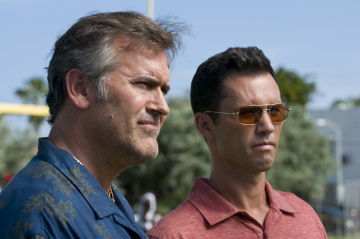 I really enjoy the spy tricks and like the MacGyverisms.
Is there any of them thatís your favorite or ones you canít wait to
show off this season?
I really enjoy the spy tricks and like the MacGyverisms.
Is there any of them thatís your favorite or ones you canít wait to
show off this season?
Yes. Thereís one episode, one of my favorite spy riffs is
in the twelfth episode this season, and weíd been thinking for a
long time about how to do an episode that centers on this.
Basically, a lot of the greatest spies, I mean this isnít a
voiceover in the episode, but a lot of the greatest spies in history
have been people who were somehow managed to be put in charge of
finding themselves. So Robert Hanson at the FBI was put in charge
of finding the mole in the FBI, and he was the mole in the FBI.
Aldridge Aims was the counterintelligence guy at the CIA in charge
of finding the mole in the CIA, and he was the mole in the CIA, and
itís just delicious. I mean, those were both horrible stains on the
history of American government and intelligence. That said, they
make for great stories, and so in the twelfth episode, we get a
chance to put Michael in the position of a guy who is hunting
himself. I donít need to get into it much more than that, but
suffice it to say that thatís an episode where Michael actually gets
to have a little bit of fun. I mean, itís not like heís laughing
maniacally, but you actually get to see that he appreciates the
irony of his situation, and itís just a really fun episode. Then,
for the MacGyverisms, the thirteenth episode is, well, itís sort of
the Burn Notice answer to Die Hard, Iíll say. We were
looking at the idea that running around with a gun in a building
full of hostages was perhapsÖ it makes for a lot of action, but itís
also a great way to get a lot of people killed. So we thought,
okay, well, what would Michael do in that situation? The answer is,
he would do a lot of really cool things, really subtly, and really
hidden. I donít want to give too many things away, but basically
watching Michael sneak around in a situation like that doing those Ė
and he builds some amazing things and comes up with some amazing
ways of turning the tables on the bad guys without them even knowing
it, and itís a lot of fun.
My question has to do, I guess, with the roots of
Burn
Notice. From episode one, it starts out heís basically picking
up the pieces or finding out about his past life. Heís starting
over, and the series is basically about his second stage of life of
an ex-spy. What inspired you to think of that? Usually you start
out with the egg hatched and the baby was born. But here, you kind
of start out in the middle of a story that really affects the story
thatís going on today. What were you thinking of when you came up
with that?
The truth is the direct inspiration was conversations that
I had had with our consulting producer, Michael Wilson, who had
worked in that environment. The thing that really struck me about
talking to him and interacting with him was that we tend to think of
people who work in those arenas as superheroes. You know, people
who are not human beings. They donít have likes and dislikes.
Theyíre just sort of robot people who protect us, and they can do
anything. I became really interested in the idea that when people
devote themselves to mastery of a craft like espionage, they pay a
real price for it. I mean as much as I love movies and books that
do the sort of like, and the price they pay is they have robot arms,
or the price they pay is mind control or things like that. Really,
in the real world, the price that these people pay is they entered
that world because itís something they need psychologically. To me
it was always a fascinating question: what sort of person wants
that? What sort of person is okay with saying I hold some ideal so
sacred that Iím willing to make my entire life a rouse in service of
that ideal? I so love my country that Iím going to go and pretend
to hate my country and have all of my friends be the enemies of my
country, and spend years doing this just so that I can strike a blow
on behalf of something that I
 care
about. You know, what is that? What sort of person devotes himself
to a single principal at that level? Thereís that question. What
background do you come from? I looked into it with Michael Wilson,
and I also read other things. Itís frankly been an interest of mine
since I was a little kid. Like, who really becomes that? Then, at
the same time, Iím interested in what are the costs ongoing. One of
the things that we talked about on the show is that things should
come at a cost. Weíll ask, what is the human dimension of this
thing that Michael is going to do? What sort of practice does he
have to undergo? He may be able to do this particular kind of
fighting, but does he enjoy doing it? Does he find it unpleasant?
Are his muscles sore for days afterwards? What are the practical
human realities of becoming this kind of superhero? So, I guess my
inspiration is a real interest in the human dimension of those
abilities: where they come from, what spurs you to want to do that,
and what price you pay ongoing. Even down to the way that I became
friends with Michael Wilson was he contacted me because he liked a
short film that I had done that was available on the Internet. As
we talked over time, I realized that all of Michaelís friends
essentially are people that he had to choose almost at random
because if you work in the world of intelligence, if you sit down at
a bar and thereís somebody next to you, and you strike up a good
conversation, and you have a wonderful time, you canít ever talk to
that person again because that person could be a plant. That person
found you. That person happened to be in the right place at the
right time, and you happened to get along with them. Itís much too
dangerous to make those kinds of friendships. You really need to
make friendships with people that you select because the danger that
someone that you randomly select on the Internet and decide I like
this guyís short film, letís be friends. The chances that Iím going
to be someone who is out to undermine him in some way are
vanishingly small. But if youíre just bumping into people on the
street, well, somebody may have put that person there for you to
bump into. It struck me, like thatís a big way to compromise your
life. Thatís a huge deal to say you can never have a friend that
you didnít choose. So, looking at what does that mean for Michael
and what does it to explore that kind of character? What does it
take out of him? It generates a lot of drama, but it generates just
as much comedy as it does drama. One of my central inspirations and
one of the things I talked about in pitching the show was something
that I had talked about with Michael and also with some other people
Ė the idea that a lot of these people who are doing this kind of
awesome commando stuff, you know, they parachute into a jungle, and
then theyíve got to run around doing things Ė if they bought that
awesome jacket at REI before they parachuted into the jungle, and
now they have to leave it behind because theyíre in the jungle.
Theyíre not really going to carry around that jacket, but they
needed it because they were parachuting through the upper
atmosphere. I had this great conversation where Ė it was actually
Michael Wilson was saying basically itís a bummer to leave that REI
jacket behind because you went and you picked it out, and it was
fun, and you kind of liked the way it fit. Then youíve just got to
leave it in the middle of the jungle. It sucks. That was hilarious
to me, and so pitching that to USA, you know, itís real. Thereís a
sort of pathos there. Your heart sort of goes out to that poor spy
who has to leave his favorite jacket behind in the jungle, and it
also sets up an awesome action scene. Itís exciting. Honestly, I
canít get enough of it.
care
about. You know, what is that? What sort of person devotes himself
to a single principal at that level? Thereís that question. What
background do you come from? I looked into it with Michael Wilson,
and I also read other things. Itís frankly been an interest of mine
since I was a little kid. Like, who really becomes that? Then, at
the same time, Iím interested in what are the costs ongoing. One of
the things that we talked about on the show is that things should
come at a cost. Weíll ask, what is the human dimension of this
thing that Michael is going to do? What sort of practice does he
have to undergo? He may be able to do this particular kind of
fighting, but does he enjoy doing it? Does he find it unpleasant?
Are his muscles sore for days afterwards? What are the practical
human realities of becoming this kind of superhero? So, I guess my
inspiration is a real interest in the human dimension of those
abilities: where they come from, what spurs you to want to do that,
and what price you pay ongoing. Even down to the way that I became
friends with Michael Wilson was he contacted me because he liked a
short film that I had done that was available on the Internet. As
we talked over time, I realized that all of Michaelís friends
essentially are people that he had to choose almost at random
because if you work in the world of intelligence, if you sit down at
a bar and thereís somebody next to you, and you strike up a good
conversation, and you have a wonderful time, you canít ever talk to
that person again because that person could be a plant. That person
found you. That person happened to be in the right place at the
right time, and you happened to get along with them. Itís much too
dangerous to make those kinds of friendships. You really need to
make friendships with people that you select because the danger that
someone that you randomly select on the Internet and decide I like
this guyís short film, letís be friends. The chances that Iím going
to be someone who is out to undermine him in some way are
vanishingly small. But if youíre just bumping into people on the
street, well, somebody may have put that person there for you to
bump into. It struck me, like thatís a big way to compromise your
life. Thatís a huge deal to say you can never have a friend that
you didnít choose. So, looking at what does that mean for Michael
and what does it to explore that kind of character? What does it
take out of him? It generates a lot of drama, but it generates just
as much comedy as it does drama. One of my central inspirations and
one of the things I talked about in pitching the show was something
that I had talked about with Michael and also with some other people
Ė the idea that a lot of these people who are doing this kind of
awesome commando stuff, you know, they parachute into a jungle, and
then theyíve got to run around doing things Ė if they bought that
awesome jacket at REI before they parachuted into the jungle, and
now they have to leave it behind because theyíre in the jungle.
Theyíre not really going to carry around that jacket, but they
needed it because they were parachuting through the upper
atmosphere. I had this great conversation where Ė it was actually
Michael Wilson was saying basically itís a bummer to leave that REI
jacket behind because you went and you picked it out, and it was
fun, and you kind of liked the way it fit. Then youíve just got to
leave it in the middle of the jungle. It sucks. That was hilarious
to me, and so pitching that to USA, you know, itís real. Thereís a
sort of pathos there. Your heart sort of goes out to that poor spy
who has to leave his favorite jacket behind in the jungle, and it
also sets up an awesome action scene. Itís exciting. Honestly, I
canít get enough of it.
Features Return to the features page